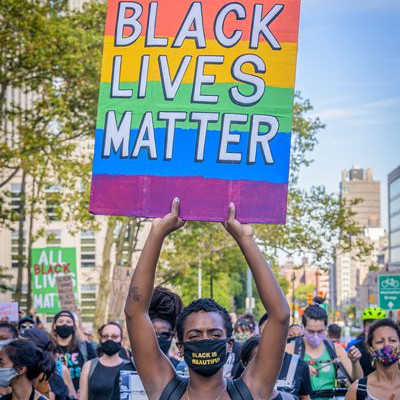Alicia Garza on Building Black Political Power and the Importance of Voting
Actress Sophia Bush interviews the Black Lives Matter co-founder ahead of the 2020 election.

Ahead of Election Day, actress Sophia Bush sits down with activist Alicia Garza to discuss her work with the Justice Fund, a syndicate of 22 Black-led and Black-centered organizations working in swing states to preserve and protect our democracy, as well as her main focus heading into November—continuing to build power for Black women—and how she plans to take her passion to the polls. The pair are tied together by their work with Defeat By Tweet, an online platform that uses President Donald Trump's tweets to crowdfund for social justice organizations. Bush is an avid supporter of the platform, and Garza is part of the Justice Fund, which receives 100 percent of donations made to Defeat by Tweet.
Sophia Bush: You have so much going on right now, but I’m so thrilled to take the time to speak with you today. To start off, how are you?
Alicia Garza: Today I’m feeling happy and focused. We’ve got to make every day count. I’m feeling hopeful, and we’ve got some cool stuff on deck that I’m excited to unleash. We can’t do everything, and I’ve been telling myself that, but in terms of the things we can do, I’m feeling ready to leave it all on the field.
SB: I love that. I feel that as well—that notion of “put it all out there” and “push as hard as we can” because we're so close. So, when we talk about that push and organizing in general, as the co-founder of Black Lives Matter, founder of Black Futures Lab, and now your work with the Justice Fund, you have really been centering conversations on building political power for Black people—in particular, Black women. Can you walk us through why that has been such a central focus for you? Why are you educating folks on the importance of building power, especially in the context of a year like 2020?
AG: First, power is important for the changes that we want to see in our lives. I think a lot of people feel helpless because they’re not sure how change happens, right? That’s not something you get taught in school or you can get a handbook on. There's no Power for Dummies—I wish we could do that. Change happens when we shift how power operates, and we’ve spent a lot of time trying to make that accessible to people because the cool thing about power is that if you don’t have a million dollars, what you can do is consolidate your contributions with others and that can equal power as well. The good news here is that an everyday, regular person who doesn’t see themselves as having any kind of extraordinary talents can actually be a key catalyst for change, and that’s what we’ve been trying to get people to see. To see their own power and that we can be the heroes in our own stories.

Alicia Garza, co-creator of #BlackLivesMatter and founder of the Black Futures Lab.
Black women are really interesting case studies here because under the worst possible conditions, Black women are certainly persevering and incredibly resilient. We’re making a way out of no way and have been doing that for a long time because the rules have been rigged against our communities for so long. But that doesn’t mean we’ve sat back and taken it. I think it was Bruce Lee who would say, “be like water,” and what we know is that water has no direction and it has every direction. It can be omnipresent and it can wear through the toughest boundaries, but can also wrap itself around boundaries, too. So, I think Black women have been showing this nation for a very long time how to be like water in pursuit of our highest aspirations for humanity and dignity and respect—not just for ourselves, but for everyone.
When we imagine what a new practice of politics looks like, it also includes a new practice of power. For us at the Black Futures Lab and the work that we’re doing with Defeat By Tweet, what we’re trying to focus on here is: If we resource the communities who have been closest to the problem but farthest from the power, we can not only flip the script, but we can change that dynamic fundamentally so that Black communities have the infrastructure we need and can build the power that we deserve and change the way that politics happens in this country. I don’t believe that power has to be parasitic. I don’t believe that power has to be corrosive.
Stay In The Know
Get exclusive access to fashion and beauty trends, hot-off-the-press celebrity news, and more.
SB: We share womanhood, but there are things I cannot understand about your experience in dismantling the kinds of power structures I grew up in and you grew up in, in learning to understand what a system of toxic power looks like. For me, one of the things I am always so in awe of is that you can see people’s true moral core when they are the farthest from proximity to traditional power. Whereas white women can be influenced by their proximity to whiteness or Black men can be influenced by their proximity to masculinity, Black women have been showing us what it means to do the work and walk the walk for so long.
While this year is certainly a dumpster fire, I am also excited that so many people seem to be discussing this and saying, “Where Black women go, where Black women lead, we want to follow.” It’s really this sort of hopefulness I’m finding in a moment like this. One of the things I think about with hopefulness and the bending of the arc and getting closer to ideals of equity is that it requires, generationally, innovation. Innovation is so key and here we are talking about technological innovation to elevate Black political power. So, when we talk about the Justice Fund and Defeat By Tweet, how have you been working to innovate in those spaces? How did you get involved?
AG: I got involved in Defeat By Tweet by accident. I had an opportunity to meet Billy [Watterson] through a separate conversation and he shared with me that he was working on a project that he thought would be cool for me to participate in and I was like “that’s great!” What I love about Defeat By Tweet is that it gives people a concrete way to be involved and to get your frustration out productively. It also highlights that there is strength and power in our resistance to the kind of power that divides our communities, that encourages us to be fearful of each other, that encourages us to not trust one another, and that encourages us to deny the fact that we depend on each other to survive. I, like everybody else, am spending a lot of time looking at screens nowadays because of the ‘rona, and it's the worst thing possible thing for me, in this moment, when I see Donald Trump attacking me and the organizations that I’ve helped build.
Now, with Defeat By Tweet, every time Donald Trump has something to say about me or our movement or anything negative that doesn't bring this country together, we are giving money to the very people who have been doing the work to bring our country together. That makes me excited.
Also, frankly, what I love about it is the focus on infrastructure. Infrastructure is what allows our communities to be powerful. We need these vehicles that can bring us together and help our communities learn about what’s going on in our lives and what we can do about it. It’s not a one-off thing, like “we’re funding you to do this one thing,” it’s a pool of resources for some of the organizations that are literally saving this country. It's an investment and a long-term interest for how we build power for the many and not the few. That's what inspires me about this project.
Yesterday...🐦 Trump tweeted 48x💰 so we donated $114,768 to Black swing-state organizers!📅 it is 11 days to the election,❤️ and because of you, we will win!October 23, 2020
SB: I geek out on it. What I think is cool is that everyone can come together and say, “I can afford to donate 50 cents per month, four dollars per month, 20 dollars per month,” whatever people can do and that money gets pooled and we’re seeing millions of dollars, sometimes on pennies worth of donations, be aggregated and given to the people who, as you said, are really readjusting and recreating new systems of power that benefit everyone. When I think about that in context of us existing in the richest nation on earth, we have the resources. What we have is a terrible distribution system.
AG: That’s right. I think Defeat by Tweet is really showing us that love can be stronger than hate—and it’s not just an idiom. You actually see people’s commitment, engagement, and involvement increase as there is an increase in the kind of hate speech and hateful policies that are being enacted right now. But it’s also a very clear sense for people who feel like things can’t change that they can effect change, and what they did helped to bend the moral arc of the universe towards justice.
Voting is a form of protest. It's a way to demonstrate what you care about and the way you want to see this country be run.
SB: It really reminds people that yes, your $50 per month does matter. In the same way that, yes, your one vote matters. We need each and every person to show up in the ways that they can. As a movement leader, in addition to donating dollars, what are other ways you would suggest for folks to engage meaningfully as we lead up to the election, and afterward, to really continue putting energy towards a re-creation here?
AG: The most important thing to be doing is to join something, or start something yourself. Make sure that you are an active participant in the decisions being made about you, right now, without you every single day. If we haven’t learned anything else from 2020, [what we have learned] is that democracy isn’t a spectator sport and the real work starts the day after the election. We get to use the election as an opportunity to see the work we’ve done thus far, but the day after gives us the opportunity to shift how it is we relate to democracy, how we relate to governance and governing, and an opportunity to keep sharpening our skills and build the world we all deserve. So my advice would be, join something! Don’t be by yourself, don’t be dismayed, don’t despair. Coming together with other people that actually care about the things you care about is a deeply resilient practice and is something that will pay dividends for years and years to come.
SB: What’s one last thing you would tell voters? Someone who perhaps feels like their vote doesn’t matter or is tired of all of the nastiness in the political landscape?
AG: Anything you leave on the table, somebody else will eat. We’ve seen that over the last four years. I mean, people thought it was in the bag and Hillary Clinton was going to be the first woman president. People thought it doesn’t matter if I vote or not, and we’ve seen tangibly that it does. So, just know that protesting politics is great and fine, but voting is a form of protest. It's a way to demonstrate what you care about and the way you want to see this country be run. But I can tell you that nobody else is affected by you not participating except for you. The people in power are not impacted by you not participating. In fact, they’re emboldened. So, I say to people, make a plan to vote! Because there are people who are planning to keep you from voting. Anything you leave on the table, opportunistic politicians will come in and they will eat what you have left and then tell you it’s your fault.
This interview has been edited and condensed for clarity.
Related:

Dedicated to women of power, purpose, and style, Marie Claire is committed to celebrating the richness and scope of women's lives. Reaching millions of women every month, Marie Claire is an internationally recognized destination for celebrity news, fashion trends, beauty recommendations, and renowned investigative packages.
-
 The 'You' Season 5 Cast Features People From Joe's Past, a New Love Interest, Madcap Twins, and More
The 'You' Season 5 Cast Features People From Joe's Past, a New Love Interest, Madcap Twins, and MoreHere's what to know about the star-studded final installment of the Netflix hit.
By Quinci LeGardye
-
 These J.Crew Sale Finds Basically Packed My Suitcase for Me
These J.Crew Sale Finds Basically Packed My Suitcase for MeI'm ready for my next vacation.
By Brooke Knappenberger
-
 Summer's Sportiest Shoe Trend Is Worth Shopping More Than Once
Summer's Sportiest Shoe Trend Is Worth Shopping More Than Once17 pairs from Nordstrom, Mango, and Zara I'm shopping now.
By Julia Marzovilla
-
 36 Ways Women Still Aren't Equal to Men
36 Ways Women Still Aren't Equal to MenFeatures It's just one of the many ways women still aren't equal to men.
By Brooke Knappenberger
-
 How New York's First Female Governor Plans to Fight for Women If Reelected
How New York's First Female Governor Plans to Fight for Women If ReelectedKathy Hochul twice came to power because men resigned amid sexual harassment scandals. Here, how she's leading differently.
By Emily Tisch Sussman
-
 Why the 2022 Midterm Elections Are So Critical
Why the 2022 Midterm Elections Are So CriticalAs we blaze through a highly charged midterm election season, Swing Left Executive Director Yasmin Radjy highlights rising stars who are fighting for women’s rights.
By Tanya Benedicto Klich
-
 Tammy Duckworth: 'I’m Mad as Hell' About the Lack of Federal Action on Gun Safety
Tammy Duckworth: 'I’m Mad as Hell' About the Lack of Federal Action on Gun SafetyThe Illinois Senator won't let the memory of the Highland Park shooting just fade away.
By Sen. Tammy Duckworth
-
 Roe Is Gone. We Have to Keep Fighting.
Roe Is Gone. We Have to Keep Fighting.How To Democracy always offers a path forward even when we feel thrust into the past.
By Beth Silvers and Sarah Stewart Holland, hosts of Pantsuit Politics Podcast
-
 The Supreme Court's Mississippi Abortion Rights Case: What to Know
The Supreme Court's Mississippi Abortion Rights Case: What to KnowThe case could threaten Roe v. Wade.
By Megan DiTrolio
-
 Sex Trafficking Victims Are Being Punished. A New Law Could Change That.
Sex Trafficking Victims Are Being Punished. A New Law Could Change That.Victims of sexual abuse are quietly criminalized. Sara's Law protects kids that fight back.
By Dr. Devin J. Buckley and Erin Regan
-
 My Family and I Live in Navajo Nation. We Don't Have Access to Clean Running Water
My Family and I Live in Navajo Nation. We Don't Have Access to Clean Running Water"They say that the United States is one of the wealthiest countries in the world. Why are citizens still living with no access to clean water?"
By Amanda L. As Told To Rachel Epstein